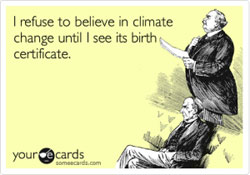By Ryan Koronowski
Why do a determined minority – often in positions of power – refuse to accept that climate change is happening despite the overwhelming scientific evidence?
A new study may provide a clue. Researchers at the University of Western Australia found that people who expressed faith in free-market ideology were also likely to reject scientific consensus that climate change is happening and that burning fossil fuels helps to cause it.

Free market philosophy makes the case that the market operates best when the government gets out of the way, but otherwise has no obvious connection to denying climate science. However, this scientific denial is not just limited to climate change:
Our findings parallel those of previous work and show that endorsement of free-market economics predicted rejection of climate science. Endorsement of free markets also predicted the rejection of other established scientific findings, such as the facts that HIV causes AIDS and that smoking causes lung cancer.
HIV and cigarettes do not have anything to do with climate change, yet those who placed their faith in the free market were skeptical of decades of research finding they caused AIDS and lung cancer, respectively. Laissez-faire doctrinarians also were not too sure about the causal role of CFCs in eroding the ozone layer.
The results go beyond scientific consensus. The researchers found that free market adherents tend to give more support to conspiracy theories about: a "world government," the attacks of September 11 being an "inside job," SARS being a government plot, the U.S. knowing about Japanese plans to attack Pearl Harbor, the Apollo moon landings taking place on a soundstage, Area 51 being home to alien bodies, and Lee Harvey Oswald not being a lone gunman, among other things.
Because this only tested correlation, it is impossible to say if free market ideology leads people to deny climate change, or if skepticism about scientific consensus leads to a belief that the government should stay out of the market, or if there is a third factor that leads to both beliefs. However, the third factor – more likely belief in conspiracy theories – lends the results added legitimacy.
The authors go on to state the problem of climate denial in academic, yet clear terms:
The prominence of conspiracist ideation in people who espouse climate denial is not entirely surprising because if an overwhelming scientific consensus cannot be accepted as the result of researchers independently converging on the same evidence-based view, then the very existence of the consensus calls for an alternative explanation.
If the scientific results are not acceptable, the system used to arrive at them must be scrapped. Free-market fans tended to be skeptical of scientific findings that implied government action would be a positive remedy.
They were supportive of theories – no matter how far out on the fringe – that put the government in a negative light. This was possibly to delegitimize it, or because their skepticism of government means they are more likely to believe negative stories about it. Climate deniers often tie climate change into both a conspiracy theory and a scientific discovery to be denied.
This speaks to a larger point about the argument for action on climate change, gun control, economic activity, housing policy, or really anything that concerns government and the public at large.
One side is perfectly happy with government inaction. In fact, obstruction and gridlock serve their ideological and practical goals. They win if nothing happens. The other side sees problems that require collective action and try to achieve policy goals through the American political system, which seems more daunting each day.
This conflict is asymmetrical – the anti-government side can play out the clock through inaction, while those trying to solve the problem need to use current system to achieve reform.
So if free-market ideology is a central factor in accepting scientific consensus, it seems the real argument on climate change is over the importance of externalities.
++++
This post first appeared on ClimateProgress:
